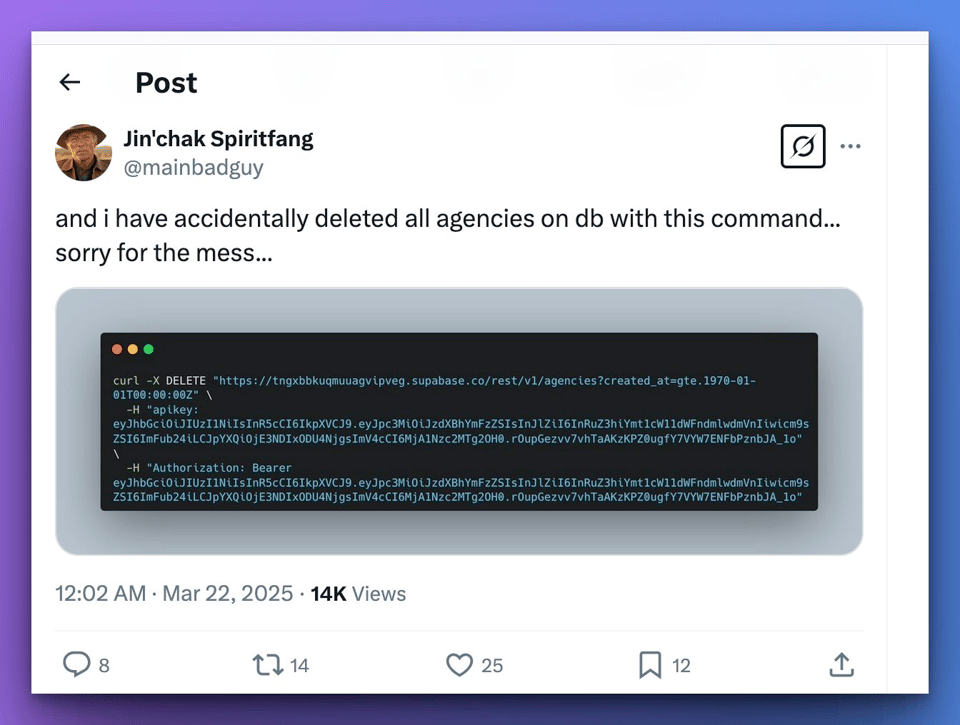Long time, no see! It’s been over four years since the last update. A lot has happened but I will save it for later.
There’s been a lot of chatter about vibe coding. There’s so much changing everyday that it’s hard to form a concrete opinion on it. Irrespective of which side you are on, I do think we should not go to the extent of dunking on people who are new to programming and making costly errors. There will be a lot more non-programmers who will be building apps in the future and we should welcome them. There’s a certain schadenfreude at the moment, especially with things like this:

And this person being on the receiving end of it...
guys, i'm under attack
— leo (@leojr94_) March 17, 2025
ever since I started to share how I built my SaaS using Cursor
random thing are happening, maxed out usage on api keys, people bypassing the subscription, creating random shit on db
as you know, I'm not technical so this is taking me longer that usual to…
I have been using a mix of Claude, ChatGPT, Copilot, and V0 for helping me with code. I’m not good at design and these tools are excellent (by my standards) at creating the initial UI that I can then fix, modify, and enhance. It has also helped me oneshot certain problems. I think these tools are great as long as we review, understand the code it is generating, and be prepared to fix things. And the most important of all: Learn about security and review for security holes. At a base level, instruct the AI to make sure it follows security guidelines (using Cursor rules or similar).
On the similar lines, I’ve been thinking about how Dylan Field explains what they try to do with Figma - “Lowering the floor, raising the ceiling” and it’s interesting to tie to the recent developments of AI and what it enables for non-programmers/developers. The rest of the interview has some interesting ideas as well.
Considering that AI is helping us with code, we are likely going to have extra time on our hands at work. Ben writes about why you should always do extra. Assuming you complete what’s assigned to you within the estimated time, you have three options for what to do with the remaining time:
1. Nothing
2. More (take up the next assigned work)
3. Extra (do work that’s not assigned - ex: improve CI/CD, learn about a library that could improve the project, etc).
Ben explains how doing “Extra” will lead to happiness. One of things to be careful about, which Ben also warns in the post, is to make sure the extra work don’t creep into the hours you put in for the normal work. Normal work is still the highest priority and should be done first.
With the stuff that’s going on with AI, you might feel lost at times. I certainly do. There’s no better time to be more agentic than today. I came across this post on Pursuing Agency and Reinvention in 30's by Mike (who I just could not find to let them know how much I loved this piece). The post is mostly about self-reflection till the last quarter where they talk about the steps they plan to take to be more agentic and links to another excellent post on How to be More Agentic by Cate Hall. My favorite part of it was:
Agency is the skill that built the world around you, an all-purpose life intensifier that lets you make your corner of it more like what you want it to be, whether that’s professional, relational, aesthetic, whatever. Build a better mousetrap. Have an enviable marriage. Start a country. No one is born with it, everyone can learn it, and it’s never too late.
These posts certainly encouraged me to finally get back to a couple of projects I had kept on hold:
This weekly newsletter that you're reading (inspired to restart it after reading many weeks of emails from Thorsten Ball's Register Spill)
A project that I wanted to build a couple of years back - ClipReads
When you start doing a lot of things, you come across as many new things that you definitely don't want to forget. Note taking is an interesting topic and I have written about it before in Issue #2 - Taking notes.
Zettelkasten is powerful but you need to spend time to set up that process and more often than not, the process takes over the purpose.
Andrej Karpathy (the legend) wrote about his process of note taking - The append-and-review note. It is simple and there's absolutely no friction. You have one note for all your notes. You append everything to the top of the note. I have been following this and a physical note. This is working out well for me. Logseq kind of does this but I have the Notes app on both my laptop and my phone, so I don't have to worry about sync.
Alright, that’s it for this week!
If you are reading this on the web, please consider subscribing.
I'm looking forward to the upcoming week and I hope you have a good one.
Cheers,
Karthik
You just read issue #4 of The Overflow. You can also browse the full archives of this newsletter.